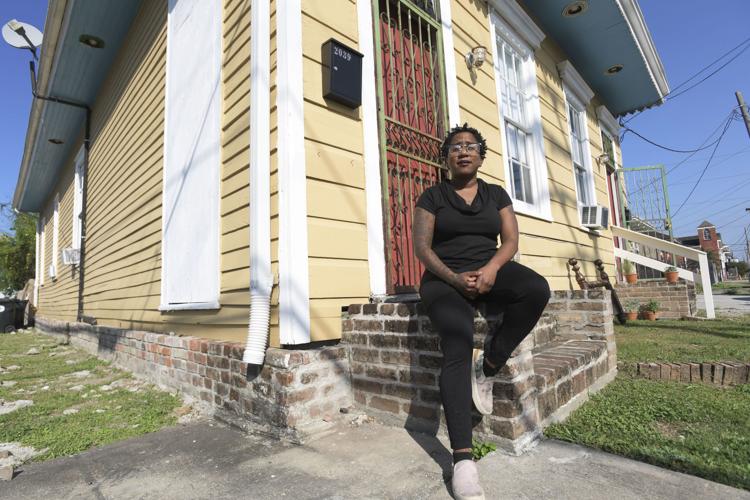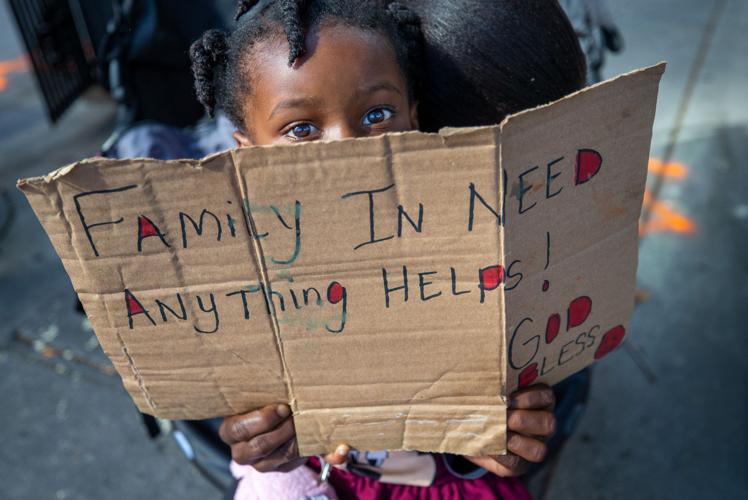[Update: The Senate passed the stimulus package just before midnight on Wednesday, and the House is expected to approve it on Friday.]
Jobless workers in Louisiana would receive $600 per week for several months as part of the massive $2 trillion stimulus package before the U.S. Senate that aims to keep the coronavirus-ravaged economy on life support.
The $600 weekly payment would go both to salaried workers who receive unemployment insurance and independent contractors who are not currently eligible for state assistance, according to policy analysts tracking the proposed legislation.
The federal measure also would extend unemployment insurance by another 13 weeks, which would be important for workers who have already been without a job for weeks and will soon exhaust their benefits. State law limits unemployment benefits to 26 weeks. Before coronavirus, in January, 111,000 people reported themselves as unemployed, or 5.3% of the state's workforce.
Malaika Burke, a tattoo artist at Hell or High Water Tattoo in New Orleans, is one of the now-unemployed workers who would become eligible for unemployment insurance under the legislation. Burke, known by her clients as Mecca, is a contract employee who last worked on March 17, and then business evaporated.

Malaika Burke, known by her clients as Mecca, is a tattoo artist at Hell or High Water Tattoo, poses in front of her home in New Orleans, La. Wednesday, March 25, 2020. Burke is one of the now-unemployed workers who would become eligible for unemployment insurance under the legislation.
The bill would make Burke eligible for half of the $216 average weekly unemployment claim in Louisiana – $108 – plus the $600, for a total of $708 per week through perhaps as long as July 31.
Burke worries about what’s ahead. But if Congress passes the stimulus measure, she said, “I’d be able to pay all bills, eat and sort of have a life. That would alleviate a considerable amount of anxiety.”
The White House and the Senate Democratic leadership announced early Wednesday morning that the two sides had reached a deal and expected to ratify the measure by noon that day. But the agreement broke down Wednesday afternoon as several Republican senators said the scale of the jobless aid was so generous that it would discourage people from returning to work. Still, lawmakers are under enormous political pressure to pass a relief measure quickly and open the federal government spigot.
Once the bill passes, how long it takes for jobless workers to begin receiving benefits will depend on each state’s unemployment system, U.S. Sen. John Kennedy told reporters on Wednesday.
“We want to get this money out the door,” Kennedy said.
As has happened in other states, Louisiana’s Workforce Commission, which oversees the state unemployment insurance system, has been overwhelmed in recent days by people applying online and over the phone.
About 10,000 jobless workers in Louisiana have applied for unemployment insurance each of the past 10 days, or 100,000 total, according to the Workforce Commission. About 1,500 people apply during a normal week.

The Hyatt Regency on Loyola Avenue is empty in New Orleans, Wednesday, March 25, 2020. (Photo by David Grunfeld, NOLA.com, The Times-Picayune | The New Orleans Advocate)
Under the state’s unemployment insurance system, jobless salaried workers can receive no more than the $247 weekly. Under the proposed legislation, they would receive an additional $600 per week, for a total of up to $847 per week for several months.
“That would be a big incentive for the working man,” said Peter Guarino, a Meraux resident who until two weeks ago had steady employment as a carpenter setting up trade shows at the Ernest N. Morial Convention Center.
Stan Veuger, a resident scholar at the American Enterprise Institute, a conservative think tank in Washington, said Congress appears likely to offer workers more generous benefits than he expected only two weeks ago.
“They’ll get a massive bump in their unemployment benefits,” Veuger said.
Many of those who have just filed claims are becoming concerned as their meager savings dwindle.
“I’m scraping the bottom of the barrel right at the moment,” said Chaz Howell, a veteran French Quarter tour guide who offers ghost and voodoo tours under the moniker Lord Chaz. “I’m literally stuck at home now.”
Howell is self-employed, and it is not clear yet whether he would be able to apply for unemployment insurance under the provision that would expand jobless benefits to contractors.
Contract employees seeking unemployment insurance would have to file a claim, said Ava Dejoie, secretary of the Louisiana Workforce Commission, although she said not all the details are yet clear.
Dejoie emphasized that anybody who files for a jobless claim has to provide a weekly certification each Sunday to continue to receive the unemployment payment.
Louisiana happens to have the stingiest unemployment system in the country, according to an analysis by the Center for Budget and Policy Priorities, a liberal think tank in Washington, D.C.
Jobless workers in Louisiana earn 23% of what they were making, which ranks the state dead last among the 50 states in the average weekly benefit it pays as a share of average weekly wages.
Only 11% of unemployed workers actually receive unemployment insurance because of restrictions on who qualifies and perhaps because the low amount they would receive discourages them from applying. The 11% rate ranks Louisiana as 46th lowest in the country.
The expanded federal aid wouldn’t do anything for Mick Stone.
Stone is a street musician in the French Quarter and mostly earns cash. He doesn’t have any documentation to show how much he earns.
Annelies Goger, a fellow at the centrist Brookings Institution think tank in Washington, said the proposed federal legislation includes many beneficial elements, but leaves out too many people on the economic margins.
“This crisis is revealing the deep holes we have that have built up over time,” Goger said.

















